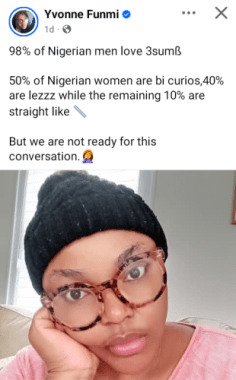A Facebook post by UK-based Nigerian woman Yvonne Funmi making sweeping statistical claims about Nigerian sexual preferences has triggered widespread online discussion, though experts question the validity of her assertions.
Funmi claimed that “98% of Nigerian men love 3sum,” while suggesting only “10% of Nigerian women are straight,” with the remainder being either “bi curious” or lesbian. Her post, which has been circulating across various platforms, concluded with the phrase “But we are not ready for this conversation.”
The viral nature of these claims highlights the appetite for discussions about sexuality in Nigerian society, even as the statistics themselves lack any apparent research foundation. No credible studies or surveys supporting these specific percentages have been identified.
Academic research on Nigerian sexuality presents a more nuanced picture than Funmi’s broad generalizations suggest. Scholarly studies have examined factors like age at first sexual intercourse and the influence of ethnicity on youth sexual behavior, but none have produced the dramatic statistics claimed in the viral post.
Research published in Archives of Sexual Behavior has studied sexual behavior patterns among Nigerian university students, finding that while premarital relationships exist, the situation is far more complex than simple percentage breakdowns.
The absence of methodologically sound research supporting Funmi’s claims raises questions about the source of her statistics. Reputable sexuality research typically involves peer-reviewed studies, representative sampling, and careful methodology – elements notably absent from a social media post.
Nigeria’s complex cultural landscape makes sweeping generalizations particularly problematic. Studies have noted how cultural norms and gender roles vary significantly by ethnicity within the country, suggesting that any meaningful analysis would need to account for this diversity rather than treating the entire population as a monolith.
The viral post also touches on sensitive topics in a society where discussions of sexual orientation and gender identity face significant legal and social challenges. Nigeria’s legal framework and prevailing social attitudes create an environment where open research on these topics remains limited.
What’s particularly striking about the online response is how quickly unsubstantiated claims can gain traction when they address topics people are curious about but rarely discuss openly. The post’s viral nature may say more about the hunger for frank conversations about sexuality than about the accuracy of its contents.
Social media’s role in spreading such claims without verification reflects broader challenges in the digital age. When provocative statements about sensitive topics circulate widely, they can shape perceptions despite lacking factual basis.
For researchers and advocates working on sexuality issues in Nigeria, viral posts like this one present both opportunities and challenges. They demonstrate public interest in these conversations while potentially spreading misinformation that could complicate serious research efforts.
The incident also raises questions about media literacy and the public’s ability to distinguish between personal opinions and research-backed findings. In an era where anyone can make statistical claims online, critical evaluation of sources becomes increasingly important.
Moving forward, the viral nature of Funmi’s post might actually serve a constructive purpose if it encourages more serious, methodologically sound research into Nigerian sexuality. However, such research would need to navigate significant cultural and legal constraints.
The controversy surrounding these claims ultimately reflects Nigeria’s ongoing tension between traditional values and evolving social attitudes, particularly among younger generations exposed to global perspectives through social media and international education.
While Funmi’s specific statistics appear to be personal assertions rather than research findings, the conversation they’ve sparked suggests there’s genuine interest in having more open, evidence-based discussions about sexuality in Nigerian society – provided they’re grounded in facts rather than speculation.
Source: newsghana.com.gh











